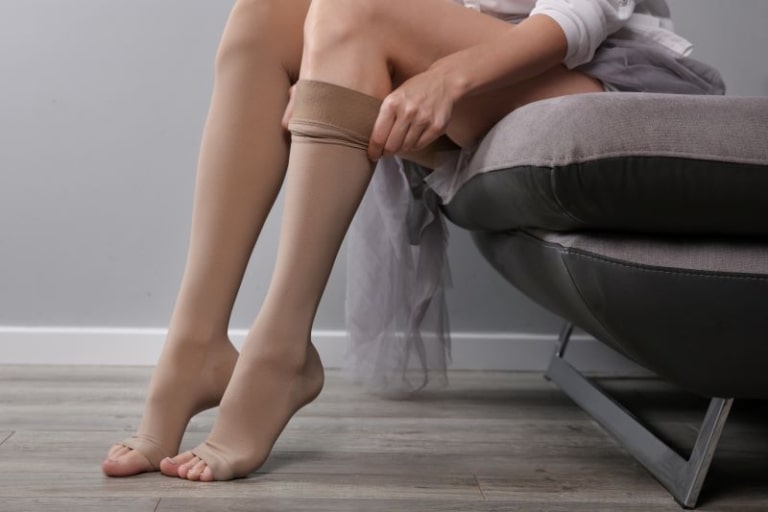Incontinence Solutions
At Main Drug Mart IDA, we understand the challenges of managing incontinence, and we’re here to help. Our pharmacy offers a wide range of discreet, high-quality incontinence products to suit your needs, including adult diapers, pads, and specialized skincare items. We provide personalized recommendations and guidance to ensure you find the right products for comfort and confidence. Additionally, we offer convenient services such as home delivery and automatic refills to make managing your care easier. Trust our team to support you with the care and convenience you deserve.


1.Consult: Talk to your doctor or pharmacist to see if compression stockings are right for you.
2.Measure: Get professionally measured by us to ensure the correct size.
3.Train: Learn the tools and techniques for best donning and doffing.
4.Ask: Find out the best times for wearing, cleaning, and maintaining.
5.Wear Daily: Wear all day, remove before bed.
6.Replace: Every 3-6 months or if damaged.
7.Monitor: Check for skin irritation and consult your doctor if issues arise.
2.Measure: Get professionally measured by us to ensure the correct size.
3.Train: Learn the tools and techniques for best donning and doffing.
4.Ask: Find out the best times for wearing, cleaning, and maintaining.
5.Wear Daily: Wear all day, remove before bed.
6.Replace: Every 3-6 months or if damaged.
7.Monitor: Check for skin irritation and consult your doctor if issues arise.
Request Our Service
Frequently Asked Questions
Got any questions? we’re here to help
What is incontinence?
Incontinence is the loss of control over bladder or bowel movements, leading to involuntary leakage of urine or feces. It can range from occasional leaks to complete loss of control.
What are the different types of urinary incontinence?
- Stress Incontinence: Leakage during activities that increase abdominal pressure, such as coughing, sneezing, or lifting.
- Urge Incontinence: A sudden, intense urge to urinate followed by involuntary leakage.
- Overflow Incontinence: Inability to empty the bladder, leading to frequent dribbling of urine.
- Functional Incontinence: Physical or cognitive impairments preventing timely bathroom use.
- Mixed Incontinence: A combination of stress and urge incontinence.
What causes incontinence?
Causes vary by type and include weak pelvic floor muscles, hormonal changes, urinary tract infections, neurological conditions, certain medications, and chronic conditions like diabetes.
How is incontinence diagnosed?
Diagnosis may involve a physical exam, medical history review, bladder diary, urine tests, and possibly imaging tests like ultrasounds or urodynamic studies.
What products are available for managing incontinence?
- Absorbent Pads and Liners: For light to moderate leakage.
- Adult Diapers and Briefs: For moderate to heavy leakage.
- Protective Underwear: Discreet, for moderate to heavy leakage.
- Bed Protectors and Underpads: To protect bedding and furniture.
- Skin Care Products: To prevent skin irritation and infection.
How can I choose the right incontinence product?
Choosing the right incontinence product depends on several factors such as the level of absorbency needed, the size and fit of the product, comfort, and your lifestyle. It’s often a good idea to try a few different types to see what works best for you. For personalized assistance, ask one of our home healthcare specialists for support. They may also be able to provide you with samples to try.
Can lifestyle changes help manage incontinence?
Yes, lifestyle changes like regular pelvic floor exercises (Kegels), weight management, fluid intake regulation, and avoiding bladder irritants (caffeine, alcohol) can help.
Are there medical treatments for incontinence?
Treatments may include medications, pelvic floor physical therapy, medical devices (pessaries), and in some cases, surgery. Consult a healthcare professional for personalized advice.
Can incontinence be cured?
Some types of incontinence can be managed or improved with treatment, while others may require ongoing management. Early intervention and treatment can significantly improve quality of life.
When should I see a doctor about incontinence?
See a doctor if incontinence affects your daily life, if you experience sudden or severe symptoms, or if you have other symptoms like pain, blood in urine, or frequent urinary tract infections.